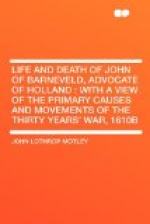It was also arranged that the envoys should delay their departure until de Bethune’s return. Meantime Henry and the Nuncius had been exchanging plain and passionate language. Ubaldini reproached the King with disregarding all the admonitions of his Holiness, and being about to plunge Christendom into misery and war for the love of the Princess of Conde. He held up to him the enormity of thus converting the King of Spain and the Archdukes into his deadly enemies, and warned him that he would by such desperate measures make even the States-General and the King of Britain his foes, who certainly would never favour such schemes. The King replied that “he trusted to his own forces, not to those of his neighbours, and even if the Hollanders should not declare for him still he would execute his designs. On the 15th of May most certainly he would put himself at the head of his army, even if he was obliged to put off the Queen’s coronation till October, and he could not consider the King of Spain nor the Archdukes his friends unless they at once made him some demonstration of friendship. Being asked by the Nuncius what demonstration he wished, he answered flatly that he wished the Princess to be sent back to the Constable her father, in which case the affair of Julich could be arranged amicably, and, at all events, if the war continued there, he need not send more than 4000 men.”
Thus, in spite of his mighty preparations, vehement demands for Barneveld, and profound combinations revealed to that statesman, to Aerssens, and to the Duke of Sully only, this wonderful monarch was ready to drop his sword on the spot, to leave his friends in the lurch, to embrace his enemies, the Archduke first of all, instead of bombarding Brussels the very next week, as he had been threatening to do, provided the beautiful Margaret could be restored to his arms through those of her venerable father.
He suggested to the Nuncius his hope that the Archduke would yet be willing to wink at her escape, which he was now trying to arrange through de Preaux at Brussels, while Ubaldini, knowing the Archduke incapable of anything so dishonourable, felt that the war was inevitable.
At the very same time too, Father Cotton, who was only too ready to betray the secrets of the confessional when there was an object to gain, had a long conversation with the Archduke’s ambassador, in which the holy man said that the King had confessed to him that he made the war expressly to cause the Princess to be sent back to France, so that as there could be no more doubt on the subject the father-confessor begged Pecquius, in order to prevent so great an evil, to devise “some prompt and sudden means to induce his Highness the Archduke to order the Princess to retire secretly to her own country.” The Jesuit had different notions of honour, reputation, and duty from those which influenced the Archduke. He added that “at Easter the King had been so well disposed to seek his salvation that he could easily




